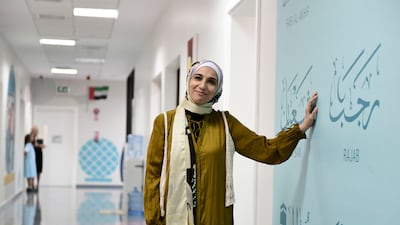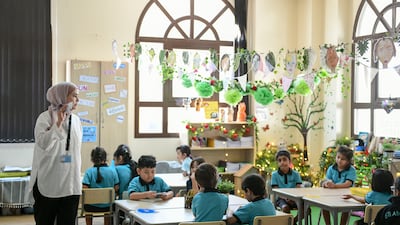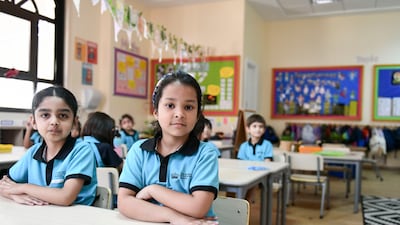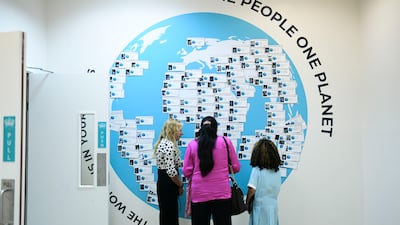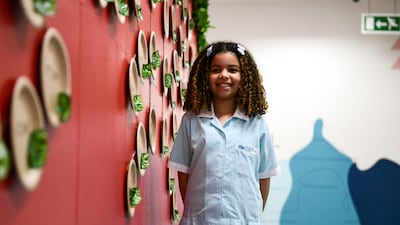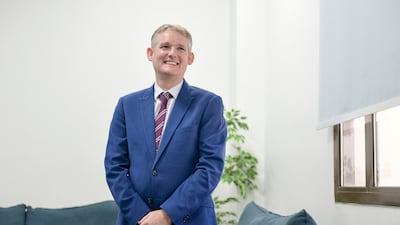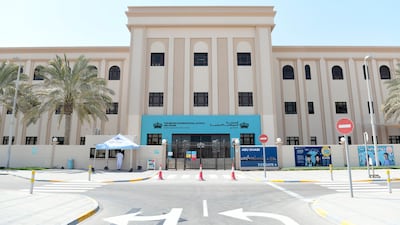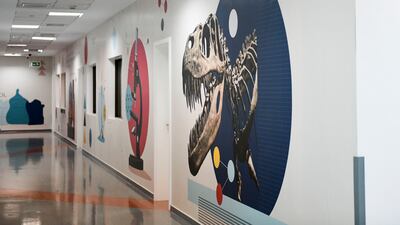A British school in Abu Dhabi that has been rated outstanding by the emirate's school regulator for promoting the UAE's national identity said it has weaved elements of the country's culture, history, heritage and, Arabic language into its UK curriculum.
British International School Abu Dhabi is home to 2,080 pupils from 96 countries, with one in five pupils at the school being Emirati.
The school was one among eight private schools in the emirate that were rated outstanding for promoting national identity by the Department of Education and Knowledge.
British International School
Principal Alan Cocker spoke of how the school worked to evolve the UK curriculum and to make sure it fits into the fabric of the UAE.
“We don’t just stick to the British curriculum. We take the core of the curriculum and open it up to the country we live in,” said Mr Cocker.
“Our social studies curriculum has evolved over the years and is taking some of the best teaching in the context of the UAE. We look at how the UAE developed, at the history of the UAE and make sure it’s part of the journey of the pupils.
“We take a holistic approach. National identity is woven into the curriculum and everyone has links to this in their curriculum.”
UAE values
From school trips to local forts and mangroves, to celebrating the UAE’s space mission and teaching Arabic with the help of videos, the school has worked to ensure pupils learn about the Emirates.
The school runs Arabic language classes for parents as well as classes on Islam and cultural sensitivity.
Mr Cocker said embedding UAE values is also introduced through field trips to sites and visitors who came to the school.
“We look at our visits and our visitors to ensure these give us the opportunity to build on cultural identity, heritage and sustainability,” said Mr Cocker.
Walking into the school, the walls are decorated with art made by pupils, often inspired by local Islamic architecture and themes.
Mr Cocker admitted that teaching pupils Arabic was not easy.
“It’s a challenge – Arabic language teaching. We invest in our Arabic teachers and make sure they are trained well," he said.
“We have Arabic days and celebrations incorporated in our calendar, and encourage pupils to celebrate their language in different ways."
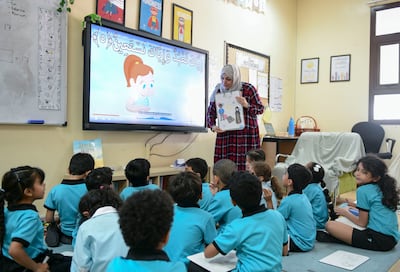
The school celebrates UAE National Day, with children taught about the significance of the country’s anthem and flag in the days leading up to December 2.
Haya Alameri, a nine-year-old Emirati pupil, was one of the children who went to see Emirati astronaut Sultan Al Neyadi when he returned from space.
Ms Alameri said she appreciated the efforts her school made to embed the UAE’s goals such as sustainability into their school life.
“I helped at a beach clean-up and I really enjoyed it. I love fish and hate throwing things in the ocean," she said.
“Also, we went to Masdar City and I liked it a lot. I really appreciate that the school celebrates National Day and our prophet’s birthday.”
The school uses the pupils' interests to encourage children to learn Arabic.
Unique approach
“If pupils are into video games or fashion or sports, these are at the heart of the class if we want to get their genuine interest," said Asem Masharfa head of Arabic at the school.
“We use videos but we speak in Arabic to get the pupil’s interest. This is our unique approach."
Mai Mahmoud, head of Islamic studies at the school, said their focus was keeping a focus on Emirati values and manners such as respect.
“We are trying to keep our values and link it to our daily work and all the subjects," said Ms Mahmoud.
"We have a trip to Tanzania and some pupils go there and help to build schools. It’s part of our global work."
The Abu Dhabi Department of Education and Knowledge – the capital's private education regulator – carried out inspections at 87 schools in the emirate under the National Identity Mark, an annual school rating system to measure work being done to integrate core Emirati values into studies.
The eight schools that received top marks for their work promoting UAE identity were: The British International School Abu Dhabi; Sheikh Zayed Academy for Girls; Sheikh Zayed Academy for Boys; Emirates National Schools, MBZ City; Al Ittihad National Private School, Khalifa City; Al Ittihad National Private School, Shakhbout City; Emirates National Schools, Branch 3 and Adnoc Schools, Sas Al Nakhl.
The evaluations encompass three central principles – culture, values and citizenship.
The culture category covers history, heritage and the Arabic language, which has been earmarked as a focus area.
The values section comprises respect, compassion, and global understanding.
Citizenship takes in topics such as a sense of belonging, volunteering, and conservation.
